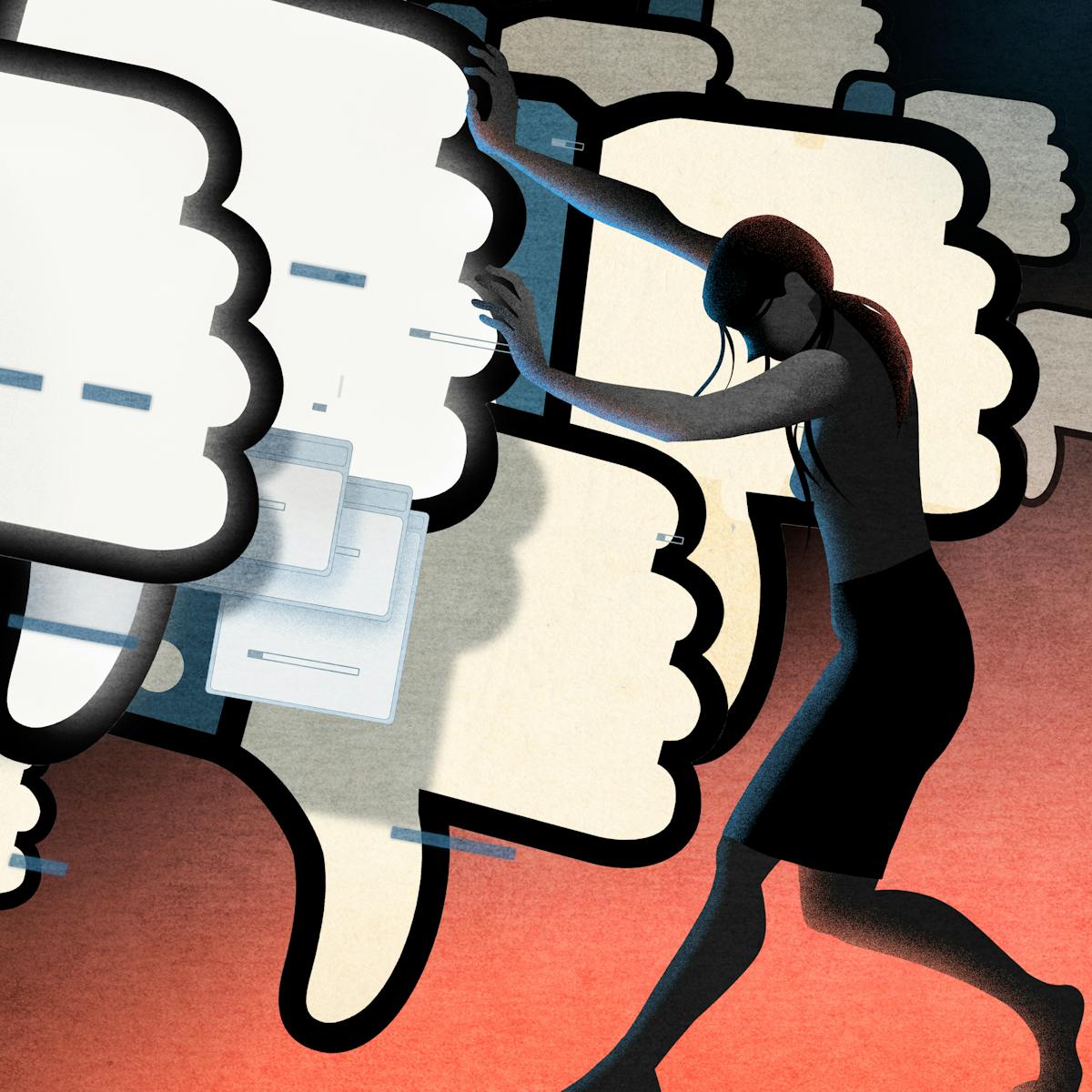The internet has encouraged a raft of negative new behaviours, including trolling and cyberbullying. Social media sites enable public humiliation that can be swift and global. Lucia Osborne-Crowley finds that, while the approbation might be virtual, the consequences of online shaming can be devastatingly real.
Shame and the online free-for-all
Words by Lucia Osborne-Crowleyartwork by Eduardo Rubioaverage reading time 7 minutes
- Serial

When I was 22 I took my first proper job as a journalist. I was working at a feminist news site covering, among other things, violence against women. I often wrote stories about Australian women who were killed by their partners, former partners or family members. I also sometimes wrote about sexual violence.
I knew that I felt strongly about advocating for the safety of women, but I never connected this feeling to what had happened to me. It would be years before I would do that.
I didn’t fully understand what was happening when I started getting the kind of online abuse that we now know is disastrously common for women journalists, or indeed any women who have a public presence online. The kind of abuse that has prompted the inventor of the internet, Tim Berners-Lee, to say it’s “not working for women and girls”.
I started receiving tweets and emails and Facebook comments saying I was worthless, that I was stupid, that I was ugly, and who did I think I was?
I started getting death threats and rape threats, too. I started getting constant, public feedback from strange men online who wanted me to know exactly what they thought of my writing, of my opinions, of my body, and of me as a person.
An army of anonymous accusers
All this almost swallowed me up. The hot, burning shame every time someone online called me ugly and stupid and wrong. The bad dreams. The fear of being seen. I can’t tell you how many times I considered quitting my job and giving up my career just so I could make it stop.
That’s the thing about shame, especially online. The fact that there are now so many tools available to those who wish to shame us, allowing them to do it with near impunity, is dangerous not only because of its volume, but because it speaks to every single lived experience of shame we have ever had.
Every time someone tells me it’s ‘just’ a tweet, and that a nasty comment can’t hurt me, I want to scream. When someone threatens me online, my fight-or-flight brain goes right back to that night, back to the bathroom stall, when someone did want to hurt me: when he could, when he did. I am that girl again – young, alone, frozen. Carrying someone else’s shame, carrying the shame of an unforgiveable act by a man whose name I will never know. Helpless.
Trial by Twitter
Shame is booming online. The ability of large groups of people, anonymous but unanimous, to come together – or ‘pile on’ – and reproach someone has exploded since YouTube, Facebook, Twitter and Instagram were invented in the late 2000s. As journalist Farah Mohammed writes, “today’s brand of mass humiliation is more public, more widespread, more scarring, and potentially more dangerous” than it has ever been.
The ritual of online shaming can be sharp and swift. In his book ‘So You’ve Been Publicly Shamed’, journalist Jon Ronson collects tales of people who have lost their livelihoods after a misstep online.
Social media seems to be allergic to the idea that a person can say sorry and learn from a mistake.
In one example, Ronson tells the story of Lindsey Stone, a charity worker who supported people with learning difficulties. Stone posted a photo of herself making a rude gesture towards a sign saying “silence and respect” at a military cemetery in Arlington, Virginia.
Within weeks, the photo had gone viral. Stone started receiving death and rape threats. “Send the dumb feminist to prison.” “Lindsey Stone hates the military and hates soldiers who have died in foreign wars.” “You should rot in hell.” “Just pure evil.”
A Facebook group calling for Stone to be fired attracted 12,000 likes in 24 hours. She was sacked the next day.
Silenced by social media
Political scientist Rita Koganzon says the reason public shaming has taken off in the social media age is because we don’t have to face our victims. Online anonymity means we can heap humiliation on others without the risk of being shamed ourselves for our unkindness or aggression. This makes silencing others through shame a much easier idea to countenance.
A cacophony of online voices talking at once makes it difficult to offer an apology for something a person may now regret. In fact, social media seems to be allergic to the idea that a person can say sorry and learn from a mistake.
These online spaces increasingly have one-chance-only cancel cultures, virtual worlds in which you cannot do a single bad thing without being a bad person. It’s not surprising that the author Zadie Smith says she is not on social media because it takes away our “right to be wrong”.
Online shaming as a tool for change
It’s possible to argue that online shaming can sometimes force change for the better. In ‘Is Shame Necessary?’, the writer Jennifer Jacquet says shame can be useful when it comes to fighting existential threats. Public shaming, although it is “a tool that many of us find discomforting”, could be “retrofitted to suit us in new ways”.
The question then becomes: how do we harness shame as a useful political – and therefore collective – tool, while also protecting ourselves and others from the very real damage it can do to our emotional health as individuals?
Taking on the trolls
People are fighting back against the kind of online shaming that does real damage. To mark the internet’s 31st birthday, Tim Berners-Lee published an article arguing that “2020 must be the year governments and companies tackle online harms against women as a top priority”. Groups like Amnesty International are campaigning to make social media sites like Twitter safer places for women.
Every time someone tells me it’s ‘just’ a tweet, and that a nasty comment can’t hurt me, I want to scream.
A movement of empathy and compassion is taking root, supported by people who have experienced public humiliation first hand. Monica Lewinsky – who was made famous after a sexual relationship with President Bill Clinton while interning at the White House – gave a TED Talk in 2015 called ‘The Price of Shame’. In it she speaks candidly about how that experience almost ruined her life and how shame followed her around for years afterwards. She describes the consequences as “devastating”.
Monica Lewinsky also notes that she was publicly shamed before the dramatic rise of social media. She believes that, these days, the problem is amplified, and humiliation has become a commodity. She’s determined to fight against cyberbullying and internet shaming, even though her TED Talk attracted a whole new wave of abuse. Commentators said that Lewinksy deserved to be shamed online because “shaming is an important part of how we shape our culture”.
TED’s social media editor, Nadia Petschek Rawls explains that they aggressively moderated the comments and deleted the abusive ones – and soon found that more positive comments began to pour in. She says that being clear about what was and was not acceptable on their platform precipitated a change in tone, and it’s how TED deals with all abusive comments now.
For me, Monica Lewinsky is the embodiment of shame recovery. She gives me hope that we can move past shame and towards a culture of empathy and understanding.
About the contributors
Lucia Osborne-Crowley
Lucia Osborne-Crowley is a writer and journalist. Her first book, ‘I Choose Elena’, was published in 2019. Her second book, ‘My Body Keeps Your Secrets’, will be published in 2020. Her news reporting and literary work has appeared in Granta, GQ, the Sunday Times, HuffPost UK, the Guardian, ABC News, Meanjin, The Lifted Brow and others.
Eduardo Rubio
Eduardo Rubio is a Mexican-born artist and illustrator living in Madrid. His work mainly involves collaboration with publishing houses and brands; he also works on personal projects, which he exhibits in galleries and museums.

